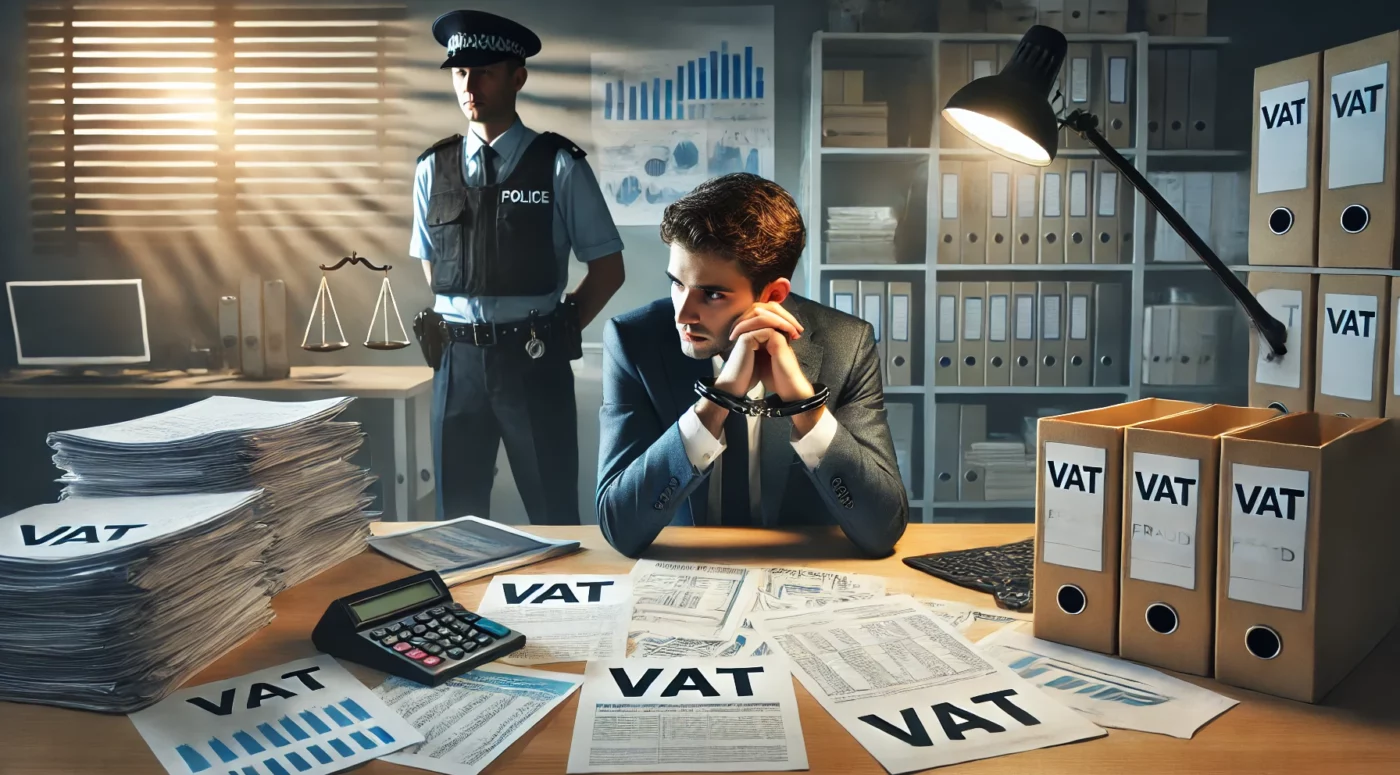

VAT fraud costs the UK economy billions of pounds annually, making it a serious offence with significant consequences. If you find yourself being arrested or charged with VAT fraud, it is very important that you seek assistance from a qualified criminal defence solicitor as early as possible to navigate the complexities of the legal process. This article will address common concerns you may have, such as whether you need a solicitor for VAT fraud, what potential defences you might have, and the likelihood of being granted bail. By understanding these key points, you can take informed steps to safeguard your legal rights.
Do I need a solicitor for vat fraud?
VAT fraud is a serious offence with potentially severe consequences, including substantial fines and even imprisonment. As a result, understanding the complexities of the charges against you and navigating the legal landscape can be overwhelming without professional help.
VAT fraud involves the evasion of Value Added Tax due to HM Revenue and Customs (HMRC). This can take various forms, such as submitting false VAT returns, claiming refunds for non-existent transactions, or knowingly participating in what is commonly referred to as carousel fraud. HMRC actively investigates and prosecutes VAT fraud, and they have extensive resources at their disposal to build a case against you.
A criminal defence solicitor specialised in VAT fraud can provide invaluable assistance in several ways:
- Expert Advice: Solicitors with experience in VAT fraud can offer you professional and tailored advice based on the specifics of your case. They have a deep understanding of tax laws and the intricacies of VAT regulations.
- Preparation and Representation: A solicitor will help you prepare your defence, gather necessary documentation, and represent you in court. This includes challenging the evidence presented by HMRC and ensuring that your rights are protected throughout the legal process.
- Negotiation with HMRC: In some cases, a solicitor can negotiate with HMRC on your behalf to reach a settlement or reduce the penalties you may face. An experienced solicitor will know the best strategies to manage these negotiations effectively.
What are possible defences for vat fraud?
One potential defence is the lack of intent to commit fraud. Prosecutors must prove that you intentionally acted to deceive the authorities. If you can demonstrate that the discrepancy in VAT payments was accidental and not deliberate, this could be a strong defence. Misunderstandings or clerical errors often occur in financial paperwork, and if you can provide evidence supporting that you acted in good faith, the charges may not hold.
Another defence could be the mistake or error defence. VAT regulations are complex, and it’s not uncommon for individuals and businesses to make errors without any fraudulent intent. If the discrepancy was due to a genuine mistake rather than an attempt to defraud HMRC, this defence might be effective.
Delegation of responsibility can also be a viable defence. If you can prove that you delegated the management of your VAT affairs to a reputable professional, such as an accountant or financial advisor, and the fraud was a result of their actions rather than yours, you might not be held responsible. In such cases, the liability may fall on the individual or firm who mismanaged the VAT returns.
A claim of due diligence can be another strong defence. This means demonstrating that you took all reasonable steps to ensure compliance with VAT laws. If you can show that you sought professional advice, kept accurate records, and followed recommended procedures, this could indicate that you took your VAT obligations seriously and did everything possible to avoid committing fraud.
Will I get bail for vat fraud?
Bail is not automatic and is determined on a case-by-case basis, influenced by several factors such as the severity of the charges and your personal circumstances. Common factors considered include:
- Nature of the Fraud: VAT fraud is considered a serious offence, especially if it involves significant sums of money or elaborate schemes.
- Previous Criminal Record: A history of prior convictions can negatively impact your chances of being granted bail.
- Risk of Absconding: The court will assess whether you are likely to flee rather than attend your trial. Strong community ties, such as family and employment, can work in your favour.
- Risk of Re-offending: If there is a concern that you may commit further offences while on bail, this can also influence the court’s decision.
- Interference with Witnesses or Evidence: The court may deny bail if there is a risk that you could interfere with the investigation or intimidate witnesses.
In some cases, conditions can be attached to your bail to mitigate any perceived risks.
Will I have to go to court if I’m arrested or charged for vat fraud?
HMRC has various ways to handle VAT fraud cases. In some instances, they may prefer to resolve matters administratively. This could involve financial penalties, repayment plans, and other non-court-based actions. If HMRC believes that the fraud was unintentional or simply due to a misunderstanding, they may take a more conciliatory approach.
However, if the evidence suggests a deliberate attempt to commit fraud and the amount involved is substantial, HMRC is more likely to pursue criminal charges. Some scenarios where you might have to go to court include:
- Significant Financial Loss: If the alleged fraud involves a significant amount of money, it increases the likelihood that HMRC will seek a criminal prosecution.
- Evidence of Deliberate Deception: Cases where there is clear evidence that fraudulent actions were taken intentionally are more likely to result in criminal charges.
- Repetitive Offences: If this is not your first run-in with VAT issues, and there is a pattern of similar behaviour, the case is more likely to be taken to court.
- Insufficient Cooperation: Failing to cooperate with HMRC can show underlying criminal intent or the intention to delay/prolong investigations unduly, which is a waste of public resources and may make appearing at court a more attractive option for prosecutors.
Will I go to jail if found guilty of vat fraud?
If found guilty of VAT fraud, the court will take into account various factors before deciding on the sentence. Here’s what you can expect:
- Severity of the Fraud: The amount of money involved plays a crucial role. Higher amounts tend to result in more severe penalties, including longer prison sentences.
- Duration of the Activities: Fraud that has been systematically carried out over a long period will likely attract harsher punishment.
- Role in the Offence: If you played a primary or leading role in the fraud, the penalties will be more severe. Those who played minor roles or were coerced into participating may receive more lenient sentences.
- Previous Criminal History: A clean criminal record could result in a lighter sentence, whereas a history of similar offences might lead to harsher penalties.
- Voluntary Disclosure and Cooperation: If you voluntarily disclose the fraud before any investigation begins, this may work in your favour.
Will I go to jail if it’s my first offence of vat fraud?
The answer to this question isn’t straightforward, as it depends on several factors, including the specifics of your case and how it is handled in court. Several factors will be considered by the court when deciding on an appropriate sentence:
- The amount of money involved in the fraud
- Whether the fraud was carried out over an extended period or was a one-off incident
- Any previous criminal record you may have
- The level of planning and sophistication involved in the fraud
- Your role in the fraud (whether you were the mastermind or a minor participant)
- The impact of the fraud on victims and the wider economy
- Your personal circumstances and character references
- Whether you cooperated with authorities and showed remorse
- Any attempts made to repay the fraudulent amount
While being a first-time offender can work in your favour, VAT fraud is considered a serious offence, and custodial sentences are not uncommon, even for first-time offenders.
Can I get Legal Aid for vat fraud?
Yes, you can get Legal Aid for VAT fraud, but certain conditions must be met to qualify for it. To determine if you qualify for Legal Aid, an assessment will be carried out to evaluate both aspects. This assessment is based on two main criteria: means and merits.
- Means test: This looks at your financial circumstances, including income, savings, and assets. If you fall below a certain threshold, you may be eligible for Legal Aid. In certain cases, even if your income is slightly above the threshold, you might still qualify by making a contribution towards your legal costs.
- Merits test: This considers whether there is a reasonable chance of your case being successful and whether it is in the interests of justice for you to be prosecuted.
Where to get more help
Understanding your rights and available defences is crucial if you or someone you care about is facing a charge for VAT fraud. With the expertise of a knowledgeable criminal defence solicitor, you can gain valuable guidance through each stage of your case. Trust in experienced professionals like those at Stuart Miller Solicitors to provide robust representation and support. Get in touch for a free consultation about your options today.
OUR COMMITMENTS TO YOU:
-
Responsive
A legal expert will consult you within 24 hours of making an enquiry.
-
Empathetic
We will always treat you with trust, understanding and respect.
-
Specialised
Your case will be handled by an expert who specialises in your type of offence.
-
Proactive
We will take early action to end proceedings as soon as it is practically and legally possible to do so.
-
Engaged
You will be kept updated on your case at all times. We will provide a named contact available to answer your questions.
-
Caring
We understand this is a difficult and stressful time for you and your family. Our team will support you every step of the way.
-
Tenacious
We will never give up on your case. We fight tirelessly to get you the best possible outcome.

